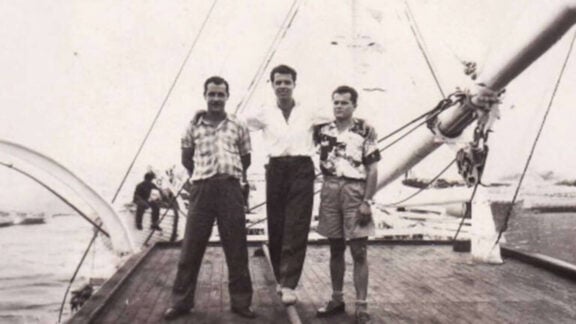My Rembetika Blues will be screened on Thursday, November 2, in Marrickville, Sydney. Greek-Australian filmmaker Mary Zournazi, in her emotional documentary, traces the journey of her forebears from Smyrna, now Izmir, in Turkey, to her home in Sydney and through this, she uncovers more than just her family’s story. Zournazi delves deep into research, resulting in an intimate understanding of how Rembetika connected millions of Asia Minor refugees huddled around the port of Piraeus and Thessaloniki and in New York. The music of Rembetika was first recorded by small studios in New York devoted to new sounds emerging from America, the Blues, Jazz and Bluegrass. It is there that the great Rosa Eskanazi, the Greek-Jewish Rembetisa, was first recorded.
Greek Asia Minor refugees shared space with African Americans, as well as new impoverished immigrants such as Jews, Armenians, and Roma, seeking refuge from the many wars and conflicts engulfing a collapsing Ottoman Empire, which sparked the catastrophic World War I, and a combusting new Soviet Russia. The documentary explores Rembetika blues visceral and deep rawness and as a musical narrative of the first great and bloody population exchanges of the 20th Century. Near two-million Greeks faced death, persecution, and eventual exile from their ancestral home in Asia Minor, now Turkey, after during the ill-fated Greco-Turkish War in 1922. These refugees in Greece, occupying the lower strata of society, leading to the creation of the Greek urban blues, the Rembetika.

The film focuses on exile and migration as the core roots of this urban blend of West and East, of Byzantine and Ottoman, or Sephardic and Klezmer, of folk and jazz. Rembetika transformed the sound of modern Greece and Greece itself. In the 1920s, the state and authorities attempted to ban Rembetika and bring the law down on those involved in playing this music. A bohemian lifestyle at the fringes of polite society and a new form of Eastern, microtonal, melismatic and passionate music did not align with the effort to ‘Westernise’ Greece by its new elites. However, over the 100 years since the birth of Rembetika, the form, like to the African-American blues, has evolved, shifted, and incorporated diverse styles of music, like Jazz, Canto, Latin, Flamenco and Rock, even new fine-tune. One of the subjects in Zournazi’s film Negros Tou Moria is an African-Greek Rapper, blends Rap, Laika, and Rembetika Blues to address contemporary issues and realities in Greece. Zournazi intertwines various stories and interviews with musicians, family members, and experts in Rembetika, commonly known as the Greek Blues.
My Rembetika Blues screens at 7pm at the Greek Atlas Community and Cultural Centre, located at 96 Illawarra Rd, Marrickville. After the screening, there will be a Q&A session with director Mary Zournazi.
For more information call 0402-564-722 / 0410-529-771 or visit greekfilmsocietysydney.com/








